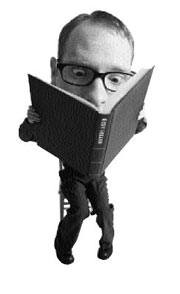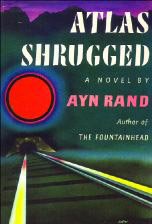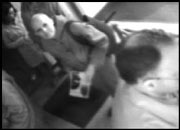IN MY HEAD I keep a running list of words I hate: eclectic, plethora, myriad, ubiquitous. . . . People who use these words should be lined up and shot. Plenty of other people make it on shorter, better words. It should be that if you say things like, “Basically, I have really eclectic taste,” or, “Coffee shops in this city are ubiquitous!” then BANG! You’re dead. That’s what should happen to you.
Sadly, the amateur poetry crowd’s vocabulary is narrower than the pseudo-intellectuals’—I’ve been to enough of these so-called poetry nights now to know. For example, as the poets read on a recent Monday at Hypocrisy, Coffee Messiah’s poetry open-mike night (think: poets in dog collars), I find myself making a list of most-used words. At this particular reading, “flesh” is mentioned more frequently than any other word (at least 10 times), followed by “dreams” and “soul” (at least eight times each), and “life,” “body,” and “rain” (at least seven times each). Other favorites in this crowd include “heart,” “blood,” and “limbs.” If poetry is instructive, here’s what I learn at Hypocrisy: Nurses, doctors, and firefighters are helpful; drinking is bad; people can’t be changed; thorns hurt; we could all use some sympathy sometimes. Also, I learn that—well, do you remember that kid who flew a plane into a Florida building because he wanted to be like Osama bin Laden?—I learn that we’re supposed to think of him as a hero. As I leave, I just have one lingering question: How exactly does one “rape a dream”? How does that work?
Homeland—at the Globe Cafe on Tuesdays—draws a bigger crowd, and by the time I arrive all the seats have been claimed. I get a face full of “Don’t sit there, that chair’s taken!” and “Just so you know, that chair’s taken, too!” Fine, I’ll stand. Words like FENCES, URN, and RAVEN are painted on the ceiling. The poet who reads first takes it upon himself to explain each poem at length before he reads it. In some cases, the explanation of the poem is longer than the poem itself.
No one seems to understand this: If a poem requires an explanation, it’s a bad poem. The other irritating aspect of this prologue ritual is that it invites questions from the audience, namely, from those people who should never be allowed to speak. Ah, here’s one now, from the back corner: “I just want to know, is your writing process organically derived or is it wholly constructed?”
Get me out of here.
WHY DO THESE readings have to be so awful? Sure, young, unpublished writers need an open forum, but do open mikes have to be this open? Can’t there be some sort of weeding-out process? And, on that note, why do we always clap, even when something sucks? Clapping after every poem is socialist. You’ve trained puppies; you know how this works. If you always clap, how are they going to learn?
Turns out, there is a format for this stuff that’s much more discriminating. It’s called Seattle Poetry Slam, and it happens Wednesday nights at Sit & Spin. Most poetry groups adopt a magnanimous spirit of communal validation, which is exactly what chokes the life out of them. The poetry slam takes the opposite tactic: Here, you wanna read a poem, you’re gonna get judged. On a number system, no less.
When I arrive early on a Wednesday, the doors to the room with the stage in it haven’t opened yet, so all these poets have to stand in line. Poets made to wait in line is the kind of thing I like to see.
Inside, a jazz band called Three-Legged Cat is up there setting the mood. Later, they’ll invite the winning poet to read as they jam with them, something the band’s frontman calls “really avant-garde and hip.”
The slam follows a set of rules: eight poets, three minutes each, five judges judging on a 10-point scale. For every 10 seconds over three minutes (and three minutes, my god, can be a lifetime), the poet’s score is incrementally reduced. Ha, ha! This is fun!
Still, the primary problem remains: The poets get to say whatever they want. They get to read poems they wrote right after they got their heart broken. They get to use phrases like “stroking your hair without a care” or “found the pot of gold at the end of her rainbow” or “the land of the consciousness deprived.” They get to write about “looking into the lake of someone’s eyes” or about being “addicted to living.” And they get to use those words that, I swear to god, were invented for poets: ethereal, octopus, oblivion, rapture, lucidity, sanctuary, wing餼/I>. . . .







